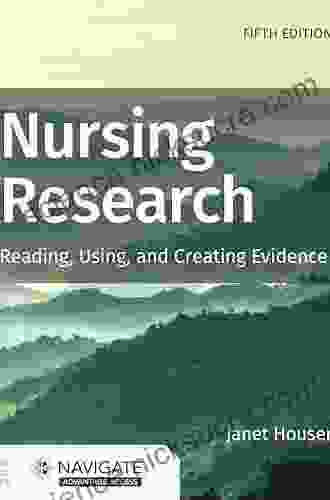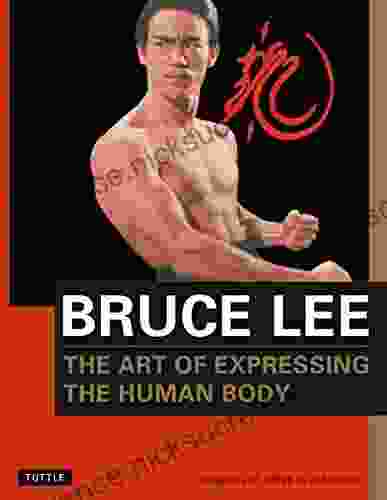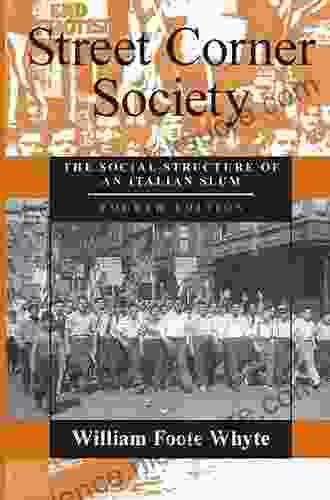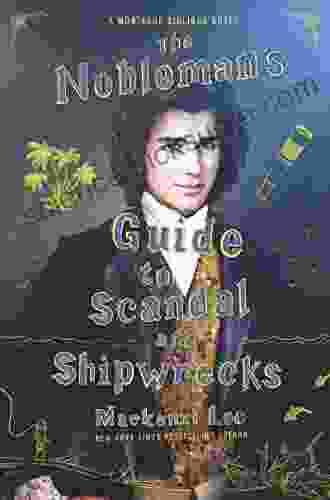Nursing Research: Reading, Using, and Creating Evidence | Comprehensive Guide

Nursing research is a systematic and rigorous process of inquiry designed to generate knowledge and improve patient care. It involves the systematic collection, analysis, and interpretation of data to answer research questions and test hypotheses. As a nurse, having a strong foundation in nursing research is essential to staying up-to-date on the latest evidence-based practices, evaluating the quality of research studies, and contributing to the advancement of the field.
4.8 out of 5
| Language | : | English |
| File size | : | 26861 KB |
| Text-to-Speech | : | Enabled |
| Screen Reader | : | Supported |
| Enhanced typesetting | : | Enabled |
| Print length | : | 520 pages |
1. Reading and Critically Appraising Nursing Research
The ability to read and critically appraise nursing research is a crucial skill for all nurses. When reading research, it is important to consider the following:
- Purpose: What is the main goal or objective of the study?
- Methods: How was the study conducted? What research design was used? What data were collected and how?
- Results: What were the findings of the study? Were the hypotheses supported or rejected?
- Discussion: What are the implications of the findings? How do they contribute to the existing body of knowledge?
- Limitations: What are the limitations of the study? How might these limitations affect the interpretation of the findings?
In addition to considering these elements, it is also important to evaluate the quality of the research study. This can be done by assessing the study's:
- Validity: Is the study design appropriate for the research question? Are the measurements valid and reliable?
- Reliability: Would the study yield the same results if it were repeated?
- Generalizability: Can the findings be applied to other populations or settings?
2. Using Evidence in Nursing Practice
Once you have identified and critically appraised relevant nursing research, the next step is to use the evidence to inform your nursing practice. This process is known as evidence-based practice (EBP). EBP involves integrating the best available research evidence with clinical expertise and patient preferences to make informed decisions about patient care.
There are five steps to EBP:
- Ask a clinical question.
- Search for the best available evidence.
- Critically appraise the evidence.
- Integrate the evidence with clinical expertise and patient preferences.
- Evaluate the outcomes of the decision.
By following these steps, nurses can ensure that their practice is based on the latest and most reliable evidence.
3. Conducting Nursing Research
In addition to reading and using research, nurses can also play a role in conducting research. This can be done through either qualitative or quantitative research methods.
- Qualitative research is used to explore complex phenomena and gain a deeper understanding of human experiences. It typically involves collecting data through interviews, observations, or focus groups.
- Quantitative research is used to test hypotheses and measure the effects of interventions. It typically involves collecting data through surveys, experiments, or clinical trials.
Nurses who are interested in conducting research should first develop a research question and then choose the appropriate research design. They should also obtain approval from an institutional review board (IRB) before beginning their study.
4. Advancing the Science of Nursing
Nursing research is essential for advancing the science of nursing and improving patient care. By reading, using, and conducting research, nurses can contribute to the development of new knowledge and best practices.
There are many ways to get involved in nursing research. Nurses can:
- Join a research team.
- Conduct their own research studies.
- Publish their research findings.
- Present their research at conferences.
- Mentor other nurses who are interested in research.
By getting involved in research, nurses can make a real difference in the lives of patients and families.
Nursing research is a vital part of nursing practice. By reading, using, and conducting research, nurses can stay up-to-date on the latest evidence-based practices, evaluate the quality of research studies, and contribute to the advancement of the field. Ultimately, this leads to better patient care and improved outcomes.
4.8 out of 5
| Language | : | English |
| File size | : | 26861 KB |
| Text-to-Speech | : | Enabled |
| Screen Reader | : | Supported |
| Enhanced typesetting | : | Enabled |
| Print length | : | 520 pages |
Do you want to contribute by writing guest posts on this blog?
Please contact us and send us a resume of previous articles that you have written.
 Fiction
Fiction Non Fiction
Non Fiction Romance
Romance Mystery
Mystery Thriller
Thriller SciFi
SciFi Fantasy
Fantasy Horror
Horror Biography
Biography Selfhelp
Selfhelp Business
Business History
History Classics
Classics Poetry
Poetry Childrens
Childrens Young Adult
Young Adult Educational
Educational Cooking
Cooking Travel
Travel Lifestyle
Lifestyle Spirituality
Spirituality Health
Health Fitness
Fitness Technology
Technology Science
Science Arts
Arts Crafts
Crafts DIY
DIY Gardening
Gardening Petcare
Petcare Richard Pears
Richard Pears Amy Edelstein
Amy Edelstein Joe Bertagna
Joe Bertagna Howard Hill
Howard Hill Billy Walsh
Billy Walsh Gina Guddat
Gina Guddat Alan R Hall
Alan R Hall Elaine Howard Ecklund
Elaine Howard Ecklund Al Marlowe
Al Marlowe Melinda Rushe
Melinda Rushe Michael Morpurgo
Michael Morpurgo Donna Morang
Donna Morang George M Fredrickson
George M Fredrickson Dmitry Zinoviev
Dmitry Zinoviev Aitzaz Imtiaz
Aitzaz Imtiaz Rebecca Jones
Rebecca Jones Emeran Mayer
Emeran Mayer Ahmed Osman
Ahmed Osman Andrew Jamieson
Andrew Jamieson Ged Jenkins Omar
Ged Jenkins Omar Kate Brian
Kate Brian Aidan Dodson
Aidan Dodson Steven H Strogatz
Steven H Strogatz Ilan Dvir
Ilan Dvir Jeremy Miles
Jeremy Miles Robert L Kelly
Robert L Kelly Amye Archer
Amye Archer Hervey Garrett Smith
Hervey Garrett Smith Aiva Books
Aiva Books Ken Schultz
Ken Schultz Vernon Coleman
Vernon Coleman Gayle Peterson
Gayle Peterson Vishwesh Bhatt
Vishwesh Bhatt Jerry Robertson
Jerry Robertson David Vine
David Vine Alice Oseman
Alice Oseman Bobby Flay
Bobby Flay Cat Warren
Cat Warren Mark Booth
Mark Booth Theodore P Jorgensen
Theodore P Jorgensen Arthur Fleischmann
Arthur Fleischmann Dean Burnett
Dean Burnett Patrick O Sullivan
Patrick O Sullivan Jacqueline Church Simonds
Jacqueline Church Simonds Angelina Wilson
Angelina Wilson Charlotte Markey
Charlotte Markey Beata Bliss Lewis Md
Beata Bliss Lewis Md Nina Lacour
Nina Lacour Mike Martin
Mike Martin Gary B Ferngren
Gary B Ferngren Markus Rex
Markus Rex John Feinstein
John Feinstein George Monbiot
George Monbiot Massad Ayoob
Massad Ayoob Gavin Francis
Gavin Francis Timm Woods
Timm Woods Alan Burdick
Alan Burdick Letisha Galloway
Letisha Galloway Jakob Tanner
Jakob Tanner Erica Westly
Erica Westly Rene D Zweig
Rene D Zweig Trevor Lund
Trevor Lund Dawn Sakamoto Paiva
Dawn Sakamoto Paiva Bradley Efron
Bradley Efron Lex Croucher
Lex Croucher Kim Stanley Robinson
Kim Stanley Robinson Clyde Fitch
Clyde Fitch Kristine Barnett
Kristine Barnett Anne Dachel
Anne Dachel Alan C Acock
Alan C Acock Dr Joseph Parent
Dr Joseph Parent Roy Dittmann
Roy Dittmann Al Sweigart
Al Sweigart Kiku Hughes
Kiku Hughes Jeanne Faulkner
Jeanne Faulkner Frances E Jensen
Frances E Jensen Judy Jewell
Judy Jewell George Plimpton
George Plimpton Kevin Williams
Kevin Williams Bruce Lee
Bruce Lee Robert A Sadowski
Robert A Sadowski Penney Peirce
Penney Peirce Chris Bowers
Chris Bowers Dr Guy Leschziner
Dr Guy Leschziner Franz Metcalf
Franz Metcalf I Johnson
I Johnson Larry Wasserman
Larry Wasserman Satya Sundar Sethy
Satya Sundar Sethy Dan Dipiro
Dan Dipiro Jon Tyson
Jon Tyson Alan Rouse
Alan Rouse Carla Schroder
Carla Schroder George Knudson
George Knudson Timothy C Smith
Timothy C Smith Ai Publishing
Ai Publishing Original Edition Kindle Edition
Original Edition Kindle Edition Aidan Comerford
Aidan Comerford Christopher Hellman
Christopher Hellman Alan Graham
Alan Graham Roxy And Ben Dawson
Roxy And Ben Dawson Jacob K Olupona
Jacob K Olupona Helen Palmer
Helen Palmer Hiro Ainana
Hiro Ainana Jill Homer
Jill Homer Suze Guillaume
Suze Guillaume Michael Casey
Michael Casey E A Koetting
E A Koetting Alaina Talboy
Alaina Talboy Hope Smith
Hope Smith Bettina Gordon Wayne
Bettina Gordon Wayne S A Klopfenstein
S A Klopfenstein Gill Rapley
Gill Rapley Sophia Joy
Sophia Joy Lisa Marasco
Lisa Marasco Alan Watts
Alan Watts Leif K Karlsen
Leif K Karlsen Terry L Duran
Terry L Duran John H Moore
John H Moore Robert E Stake
Robert E Stake Erin Ekins
Erin Ekins Erin Lovelace
Erin Lovelace Jay Revell
Jay Revell Dave Heller
Dave Heller Anne Enright
Anne Enright Steve Moore
Steve Moore Collins Easy Learning
Collins Easy Learning Jacqueline Fitzpatrick
Jacqueline Fitzpatrick Matt Mosher
Matt Mosher Helena Clare
Helena Clare David Roberts
David Roberts Gillian Gill
Gillian Gill Jessica Cornwell
Jessica Cornwell Julie Bradley
Julie Bradley Samuel N Rosenberg
Samuel N Rosenberg Isabella Morris
Isabella Morris Alan Vermilye
Alan Vermilye Alfred S Posamentier
Alfred S Posamentier Paramahansa Yogananda
Paramahansa Yogananda Michael Gray
Michael Gray Douglas G Altman
Douglas G Altman J R Haseloff
J R Haseloff Christos A Djonis
Christos A Djonis Gary Player
Gary Player Bianca Smith
Bianca Smith G H Hardy
G H Hardy Zita West
Zita West Peg Tyre
Peg Tyre John Bird
John Bird Sandy Lindsey
Sandy Lindsey Aja Raden
Aja Raden Ainsley Arment
Ainsley Arment M K Hume
M K Hume Melissa Bashardoust
Melissa Bashardoust Shaun Tomson
Shaun Tomson Joyce Burkhalter Flueckiger
Joyce Burkhalter Flueckiger Thomas Metzinger
Thomas Metzinger Truman Everts
Truman Everts Dusty Rhodes
Dusty Rhodes Gary R Varner
Gary R Varner Michael W King
Michael W King Susan B Lovejoy
Susan B Lovejoy Joe Clement
Joe Clement Christopher Scordo
Christopher Scordo Aileen Erin
Aileen Erin Kardas Publishing
Kardas Publishing John J Miller
John J Miller Jonathan White
Jonathan White Robert M Emerson
Robert M Emerson Graham Bower
Graham Bower Douglas Noll
Douglas Noll Mike Warren
Mike Warren Taquetta Baker
Taquetta Baker Vasilis Konstantinos Giontzis
Vasilis Konstantinos Giontzis Al Pasha
Al Pasha Alan E Kazdin
Alan E Kazdin Al Ristori
Al Ristori David D Burns
David D Burns Elizabeth Thompson
Elizabeth Thompson Takuan Soho
Takuan Soho Percy Boomer
Percy Boomer Bryon Powell
Bryon Powell Harold Klemp
Harold Klemp Stephanie Izard
Stephanie Izard Doug Gelbert
Doug Gelbert Kerry Diamond
Kerry Diamond Cindy Hudson
Cindy Hudson Donald Woods Winnicott
Donald Woods Winnicott Steven Horak
Steven Horak Tim Gallagher
Tim Gallagher David King
David King Brandy Roon
Brandy Roon Madeline Milne
Madeline Milne Layla Moon
Layla Moon J Zoltan
J Zoltan James A Michener
James A Michener Magnus Thollander
Magnus Thollander Katharine Graves
Katharine Graves Deborah Harkness
Deborah Harkness Al Desetta M A
Al Desetta M A Conor Daly
Conor Daly Jacqueline Tourville
Jacqueline Tourville Tina Dreffin
Tina Dreffin Michael Shermer
Michael Shermer Lauren Blackwood
Lauren Blackwood Tonya Johnston
Tonya Johnston Chris Vines
Chris Vines Linda Welters
Linda Welters Kai Nacke
Kai Nacke Alan E Sparks
Alan E Sparks Judith Garrard
Judith Garrard Spencer Wells
Spencer Wells Jack Nicklaus
Jack Nicklaus Celeste Headlee
Celeste Headlee We Fairbairn
We Fairbairn Jon Emmett
Jon Emmett Lee Carroll
Lee Carroll Kidada Jones
Kidada Jones Jerry Robeson
Jerry Robeson Anahad O Connor
Anahad O Connor Rosemarie Anderson
Rosemarie Anderson Molly Absolon
Molly Absolon Jane Poynter
Jane Poynter Noel St Clair
Noel St Clair Josh Kilmer Purcell
Josh Kilmer Purcell Joe Berardi
Joe Berardi Leigh Sales
Leigh Sales James Gleick
James Gleick Dennis Jarecke
Dennis Jarecke The Rogue Hypnotist
The Rogue Hypnotist G E R Lloyd
G E R Lloyd Denise Alvarado
Denise Alvarado Alan Shipnuck
Alan Shipnuck Dr David Geier
Dr David Geier Pantea Kalhor
Pantea Kalhor Nicholas Romanov
Nicholas Romanov Olivia Gentile
Olivia Gentile Thubten Chodron
Thubten Chodron Kelly Jensen
Kelly Jensen Andy Adams
Andy Adams Al Barkow
Al Barkow George Buehler
George Buehler Gregory J Davenport
Gregory J Davenport Nassim Nicholas Taleb
Nassim Nicholas Taleb Jeff Maynard
Jeff Maynard Amelia Mayer
Amelia Mayer Juno Roche
Juno Roche Robert Macfarlane
Robert Macfarlane Princess Her
Princess Her Sara Wickham
Sara Wickham Lingo Mastery
Lingo Mastery Zondervan
Zondervan Kareem Abdul Jabbar
Kareem Abdul Jabbar Dorothy H Crawford
Dorothy H Crawford Brian Mills
Brian Mills Antipodean Writer
Antipodean Writer Kevin Hunter
Kevin Hunter Brenda Nathan
Brenda Nathan Frank E Harrell Jr
Frank E Harrell Jr Alan S Kaufman
Alan S Kaufman Aileen Nielsen
Aileen Nielsen Alan Gelb
Alan Gelb Jackson Katz
Jackson Katz Robert Heidler
Robert Heidler Clint Emerson
Clint Emerson Jonathan Gottschall
Jonathan Gottschall Florence Williams
Florence Williams Mark Drolsbaugh
Mark Drolsbaugh Eddy Starr Ancinas
Eddy Starr Ancinas Mel Thompson
Mel Thompson Morgan Lyle
Morgan Lyle Samuel Carbaugh
Samuel Carbaugh Helen Hollick
Helen Hollick Belinda Luscombe
Belinda Luscombe Will Storr
Will Storr Sara Hanover
Sara Hanover Scott Surovich
Scott Surovich Howard Maxwell
Howard Maxwell R A Salvatore
R A Salvatore Akwaeke Emezi
Akwaeke Emezi Nancy Hughes
Nancy Hughes George E Andrews
George E Andrews Jan Smith
Jan Smith Jessica Cunsolo
Jessica Cunsolo Terry Funk
Terry Funk Yang Jwing Ming
Yang Jwing Ming Steven Trimble
Steven Trimble Alan Margot
Alan Margot Harriet Brown
Harriet Brown Jill Stamm
Jill Stamm Meredith Marsh
Meredith Marsh Vera Nazarian
Vera Nazarian Marcus Chown
Marcus Chown Gary Smith
Gary Smith Miles Mckenna
Miles Mckenna David Crabtree
David Crabtree Pallas Snider
Pallas Snider Robin Mckinley
Robin Mckinley John Riley
John Riley Daphne Rose Kingma
Daphne Rose Kingma Michael Domican
Michael Domican Megan Gray Md
Megan Gray Md Rick Bass
Rick Bass Sir Edmund Hillary
Sir Edmund Hillary Dimitri Loose
Dimitri Loose Howard Greene
Howard Greene Margit Ystanes
Margit Ystanes Michael Sidgwick
Michael Sidgwick Esther Parry
Esther Parry Alan Hearnshaw
Alan Hearnshaw Constance Classen
Constance Classen Shoshana Levin Fox
Shoshana Levin Fox Damon Lee
Damon Lee Rose Lynn Fisher
Rose Lynn Fisher Mackenzi Lee
Mackenzi Lee Andy Zipser
Andy Zipser Cynthia Clumeck Muchnick
Cynthia Clumeck Muchnick John T Hansen
John T Hansen Nilakantasrinivasan J Neil
Nilakantasrinivasan J Neil Jay Annelli
Jay Annelli Mark Harris
Mark Harris Linda G Morris
Linda G Morris Matthew Sturm
Matthew Sturm Akil Palanisamy
Akil Palanisamy Jay H Lefkowitch
Jay H Lefkowitch Mendocino Press
Mendocino Press Dave Whitson
Dave Whitson Alan Lawrence Sitomer
Alan Lawrence Sitomer Martin Erwig
Martin Erwig Catherine Belknap
Catherine Belknap Caitlin Zaloom
Caitlin Zaloom Benjamin Johnston
Benjamin Johnston Stephen M Camarata
Stephen M Camarata William Foote Whyte
William Foote Whyte Mariam N Ottimofiore
Mariam N Ottimofiore James F Boswell
James F Boswell Rand Cardwell
Rand Cardwell Andre Agassi
Andre Agassi Habeeb Quadri
Habeeb Quadri Francesca Lia Block
Francesca Lia Block Teresa Mccallum
Teresa Mccallum Aimee Aristotelous
Aimee Aristotelous Bryan Mann
Bryan Mann Snap Summaries
Snap Summaries Eden O Neill
Eden O Neill Albert Einstein
Albert Einstein Jane Bottomley
Jane Bottomley Arnold Yates
Arnold Yates Lecile Harris
Lecile Harris Al Strachan
Al Strachan Pavel Tsatsouline
Pavel Tsatsouline Kiersten White
Kiersten White Alana Mclaren
Alana Mclaren Gordon R Dickson
Gordon R Dickson William Harding
William Harding Andrew Rowe
Andrew Rowe Janice Selekman
Janice Selekman Bill Parisi
Bill Parisi Karen Levin Coburn
Karen Levin Coburn Alan S Gurman
Alan S Gurman Tenth Edition Revised Kindle Edition
Tenth Edition Revised Kindle Edition Aileen Evans
Aileen Evans Louis Schubert
Louis Schubert Jordon Greene
Jordon Greene Charles J Thayer
Charles J Thayer Orson Scott Card
Orson Scott Card Alastair Humphreys
Alastair Humphreys Hammad Fozi
Hammad Fozi Publishdrive Edition Kindle Edition
Publishdrive Edition Kindle Edition Contractor Education Inc
Contractor Education Inc Rebekah Sack
Rebekah Sack Steve Michalik
Steve Michalik Margaret J Wheatley
Margaret J Wheatley Mike Rothschild
Mike Rothschild Ndeye Labadens
Ndeye Labadens Alan Garner
Alan Garner Rehana Jawadwala
Rehana Jawadwala Michael Miller
Michael Miller William A Kaplin
William A Kaplin Lo Bosworth
Lo Bosworth Thomas Kurz
Thomas Kurz David F Kelly
David F Kelly Nick Hughes
Nick Hughes Hannah Ewens
Hannah Ewens Bob Plott
Bob Plott Nick Lyons
Nick Lyons Jessica Battilana
Jessica Battilana Christopher Willard
Christopher Willard Stephen Wolfram
Stephen Wolfram John Leo
John Leo David A Sousa
David A Sousa Martin Luther King Jr
Martin Luther King Jr E Cheng
E Cheng Farlex International
Farlex International Al Roker
Al Roker Jay Speight
Jay Speight Janet Houser
Janet Houser Michael D Rich
Michael D Rich Craig Childs
Craig Childs Tom Shachtman
Tom Shachtman Al Yellon
Al Yellon Skeleton Steve
Skeleton Steve Alex Light
Alex Light Andrew Blum
Andrew Blum Saul Rip
Saul Rip Bill Walker
Bill Walker Mary Basick
Mary Basick Kate Bettison
Kate Bettison Alan Booth
Alan Booth Charles B White
Charles B White Jane P Gardner
Jane P Gardner 12th Edition Kindle Edition
12th Edition Kindle Edition Mark Occhilupo
Mark Occhilupo Ann Hagedorn
Ann Hagedorn Courtney Macavinta
Courtney Macavinta David Jason
David Jason Ken Denmead
Ken Denmead John Muir
John Muir United States Government Us Marine Corps
United States Government Us Marine Corps Carl Gustav Jung
Carl Gustav Jung Peter Hathaway Capstick
Peter Hathaway Capstick Laurie Pickard
Laurie Pickard Andrea Travillian
Andrea Travillian Anthonissa Moger
Anthonissa Moger Alan Murchison
Alan Murchison Vanessa Ogle
Vanessa Ogle S Connolly
S Connolly Michael Freedland
Michael Freedland Bob Mayer
Bob Mayer Martin J Pring
Martin J Pring Peter Irvine
Peter Irvine Sonia Nazario
Sonia Nazario Noha Mellor
Noha Mellor Anders Halverson
Anders Halverson Grace Lebow
Grace Lebow Rob Casey
Rob Casey Alana Chernila
Alana Chernila Ron L Deal
Ron L Deal Douglas T Hall
Douglas T Hall Edupan7 Publishing
Edupan7 Publishing Barbara Oehlberg
Barbara Oehlberg Jim Steenburgh
Jim Steenburgh W E Fairbairn
W E Fairbairn Jenni Hicks
Jenni Hicks Chris Klug
Chris Klug Paul G Schempp
Paul G Schempp Betsy Tobin
Betsy Tobin John Irving
John Irving Po Bronson
Po Bronson Shing Tung Yau
Shing Tung Yau James Witts
James Witts Celeste Jones
Celeste Jones Barbara Scott
Barbara Scott James Willard Schultz
James Willard Schultz Dylan Alcott
Dylan Alcott Sheila Barton
Sheila Barton Terry Breverton
Terry Breverton Arnold Haultain
Arnold Haultain Kerstin Gier
Kerstin Gier Bill Friedrich
Bill Friedrich Lexie Scott
Lexie Scott Gordon H Orians
Gordon H Orians Len Sperry
Len Sperry Marc M Triola
Marc M Triola Matthew Mcbee
Matthew Mcbee Alan Lightman
Alan Lightman Al Owens
Al Owens Gail Tully
Gail Tully Alice Scordato
Alice Scordato Juliet Marillier
Juliet Marillier Aidan Chambers
Aidan Chambers Tod E Bolsinger
Tod E Bolsinger Emily Harris Adams
Emily Harris Adams Anna Hickey Moody
Anna Hickey Moody Wayne Stewart
Wayne Stewart Martin Rooney
Martin Rooney Al Macy
Al Macy Michal Stawicki
Michal Stawicki Kevin B Shearer
Kevin B Shearer Marsha Wenig
Marsha Wenig Micky Ward
Micky Ward Lisa Kenney
Lisa Kenney Jamie Baulch
Jamie Baulch Amelia Simmons
Amelia Simmons Mark Goulston
Mark Goulston Lj Andrews
Lj Andrews Christopher Gavigan
Christopher Gavigan Sam J Fires
Sam J Fires Natazha Raine O Connor
Natazha Raine O Connor Carol Tuttle
Carol Tuttle Joanne Webb
Joanne Webb Bruce J Macfadden
Bruce J Macfadden Amanda Ford
Amanda Ford Alan Porter
Alan Porter Lisa Newton
Lisa Newton Edward A Tiryakian
Edward A Tiryakian Daniel C Okpara
Daniel C Okpara Mista Nove
Mista Nove Deitra Leonard Lowdermilk
Deitra Leonard Lowdermilk Toby Wilkinson
Toby Wilkinson Sarah Hendrickx
Sarah Hendrickx Peter Ballingall
Peter Ballingall Don Casey
Don Casey Mykel Hawke
Mykel Hawke Aphra Behn
Aphra Behn
Light bulbAdvertise smarter! Our strategic ad space ensures maximum exposure. Reserve your spot today!
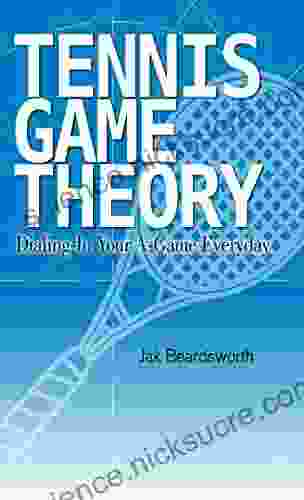
 John Dos PassosDialing In Your Game Every Day: A Comprehensive Guide to Achieving Consistent...
John Dos PassosDialing In Your Game Every Day: A Comprehensive Guide to Achieving Consistent...
 Houston PowellMoon Oregon Travel Guide by Judy Jewell: A Comprehensive Exploration of the...
Houston PowellMoon Oregon Travel Guide by Judy Jewell: A Comprehensive Exploration of the...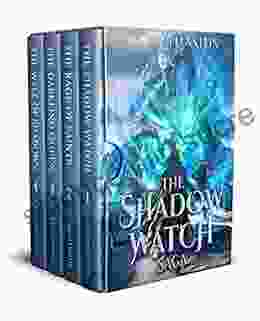
 Edwin BlairThe Shadow Watch Saga: An Epic Fantasy That Will Keep You on the Edge of Your...
Edwin BlairThe Shadow Watch Saga: An Epic Fantasy That Will Keep You on the Edge of Your... Kirk HayesFollow ·9.6k
Kirk HayesFollow ·9.6k Roy BellFollow ·16.8k
Roy BellFollow ·16.8k Bruce SnyderFollow ·6.3k
Bruce SnyderFollow ·6.3k Brett SimmonsFollow ·3.6k
Brett SimmonsFollow ·3.6k Corey HayesFollow ·3.1k
Corey HayesFollow ·3.1k Blake KennedyFollow ·8.2k
Blake KennedyFollow ·8.2k Jon ReedFollow ·19.9k
Jon ReedFollow ·19.9k Arthur C. ClarkeFollow ·19.5k
Arthur C. ClarkeFollow ·19.5k
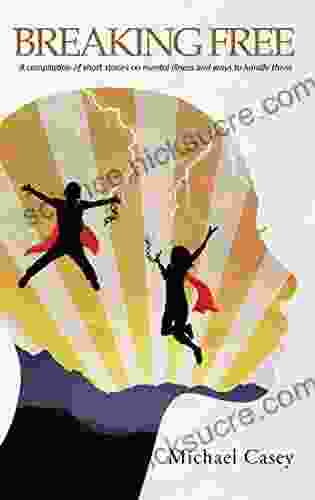
 Deacon Bell
Deacon BellCompilation of Short Stories on Mental Illness and Ways...
Mental illness is a serious issue that affects...
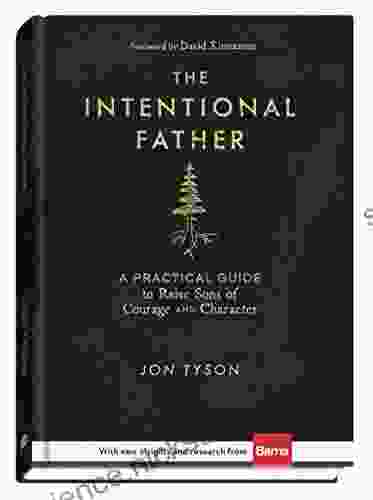
 Jonathan Hayes
Jonathan HayesThe Practical Guide to Raising Courageous and...
As parents, we all want...
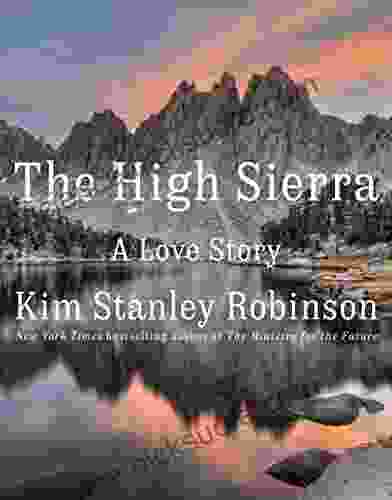
 Carlos Fuentes
Carlos FuentesA Journey to Remember: The High Sierra Love Story of...
Prologue: A Wilderness Encounter Beneath...
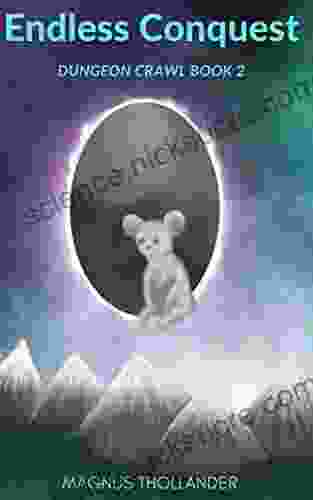
 Douglas Foster
Douglas FosterEndless Conquest: Embark on an Immersive Dungeon Crawl in...
Endless Conquest is a captivating LitRPG...
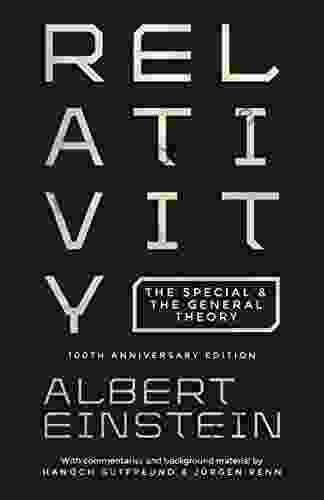
 Caleb Long
Caleb LongThe Special and the General Theory 100th Anniversary...
The year 2015 marks a...
4.8 out of 5
| Language | : | English |
| File size | : | 26861 KB |
| Text-to-Speech | : | Enabled |
| Screen Reader | : | Supported |
| Enhanced typesetting | : | Enabled |
| Print length | : | 520 pages |


